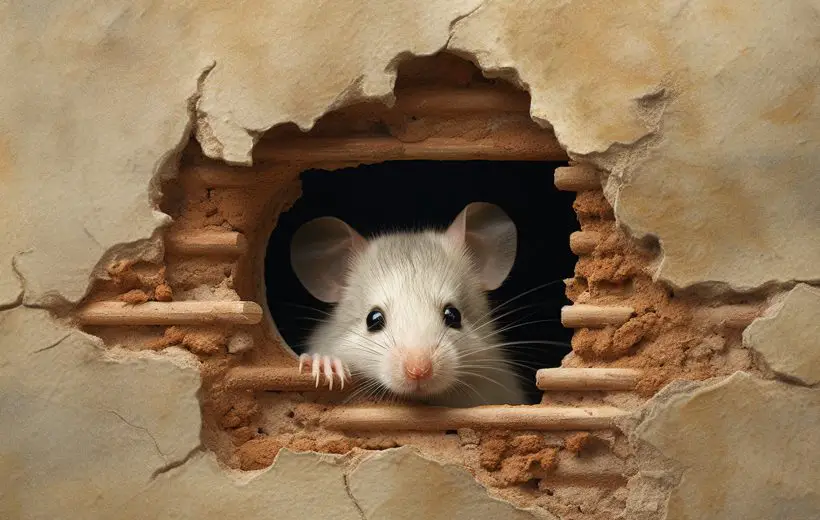How Long Does It Take A Mouse To Chew Through A Wall? How To Stop It
A mouse has a pair of upper and lower incisors that never stop developing. It is no wonder these rodents usually gnaw on just about anything to keep the teeth from growing. This includes chewing through walls.
But how long does it take a mouse to chew through a wall? Typically, it can take a mouse less than 2 hours, several days, or weeks to chomp through a wall. However, the time varies depending on the material the wall is constructed from. Additionally, the time frame may change based on food availability, the size of the mouse, etc.
So then, how do you stop the mice from chewing through the walls? This guide covers everything you need to know about mice gnawing through various wall materials.
How Long Does It Take A Mouse To Chew Through A Wall
Generally, a mouse can take less than 2 hours to chew through a wall. In some cases, it could take several days or weeks for the mouse to munch through the wall. The exact time frame depends on various factors such as:

1. Type of Material
The type of material the wall is made of determines how fast a mouse chews through it. This is because some wall materials are thicker than others.
For example, a mouse can take less than 2 hours to chew through a drywall structure or plywood wall. This is because these materials are soft and thin. However, wooden walls may take a mouse longer, up to a couple of weeks, to munch through.
2. Food Availability
When a mouse is exceedingly hungry and looking for something to eat or drink, it will likely chew through a wall faster. This is because it will be desperate to find food.

3. Purpose or Motivation
Sometimes, a mouse will chew through a wall just for the sake of it. In this case, the process can last several days or weeks. After all, the mouse does not have a specific motive for chewing through the drywall.
However, if gnawing through the wall is to find shelter, the rodent will chew much faster.
4. Number of Mice
The number of mice chewing through the wall and in the same spot also determines how long the process takes. If it is just one, it will take longer. But if there are two or more, it will take them a shorter time to gnaw through the drywall.
5. Mouse Size
Typically, an adult mouse can chew through a wall faster than its young counterpart. This is because an adult mouse has more chewing experience and fully developed teeth, better suited for gnawing through walls.
How To Tell You Have A Mouse Chewing Through A Wall
If you are uncertain whether you have a mouse chewing through your walls, here is how to tell for sure:

Unusual Noises or Sounds
When a mouse is munching through a wall, you might hear chewing, scratching, or scurrying noises. You will overhear these sounds at night coming from inside the walls.
One of the ways to confirm if the sounds are from a mouse chewing through your walls is to bang on the wall. If the noises stop for a while, you likely have a mouse.
Gnawing Marks
You can tell a mouse is chewing through your wall if you spot gnaw marks on the edges of walls. These marks will usually be around 1 to 2 mm wider per pair of teeth.
Entry Points or Holes
Another way is to inspect the outside of your house for signs of entry points and holes. Simply look out for roughly or irregular-shaped openings in the corners of your house and nickel-sized holes in the walls.
Droppings
If a mouse spends several days or weeks chewing through a wall, it will leave some droppings behind. These droppings look like dark brown or black granular pellets.
Sawdust
Every time a mouse chomps through a wall, there will be tiny piles of wood dust or fiber. Sometimes, you may find these wood shavings or sawdust around the house.
How to Stop a Mouse From Chewing Through a Wall
You should implement some measures to stop the mouse from chewing through the wall. Here are the ways you can follow through:

1. Sealing all the Entry Points
By eliminating easy access or entry points, you can stop the mice from infesting your house in the first place. Eliminating the entry points includes sealing any cracks in the foundation and openings in the walls.
In addition, you should seal window and door gaps using weather stripping. Simply ensure any opening left unsealed cannot fit a pencil. This is because of their small size; they can squeeze into the smallest cracks.
2. Setting Traps
You can use snap traps, wooden, or press-and-set traps to stop a mouse from munching through walls. Snap traps are built to kill the mouse instantly when triggered.
However, for traps to be effective, you must set them correctly where the mice travel. Also, you must place a small bait near the trap to lure the mouse.
3. Apply a Mouse-Repellent
Alternatively, you can try using a mouse repellent. Like rats, mice hate the smell of some repellents and will stay away from areas that have them. For example, you can use a repellent containing ammonium. This is because ammonia smells like a predator’s urine. Other repellents to use include:
- Mint or pepper cayenne pepper smells
- Dried lavender
- Peppermint oil
- Cinnamon
- Apple cider or white Vinegar
- Mothballs

4. Use Rodenticides
Rodenticides contain toxic elements, making them potent for stopping mice from infesting your house and chewing through the walls. They work by causing internal bleeding once a mouse ingests them.
If using rodenticides, place the bait station along the wall where you have sighted signs of mouse activity. Just make sure it is inaccessible to pets and children.
5. Contact a Pest Control Expert
If the above methods don’t work, contacting a pest control professional is best.
What Happens If You Don’t Stop Mice from Chewing Through A Wall
If you allow mice to continue munching through the walls, they will creep into your home and cause more damage. For example, they can weaken your home’s structural integrity over time.

They can also lead to increased health issues. This is because mice carry mites, fleas, and diseases like hantavirus, leptospirosis, and salmonella. Other problems they may cause include:
- Damage to clothing, books, furniture, and important papers
- House fires from chewing through electrical wiring
- Increased mice infestation
- Difficulty sleeping due to scratching noises
- Unpleasant odors from their droppings and urine
- Food contamination from their droppings
FAQs
Below, we will respond to commonly asked queries regarding how long it takes a mouse to gnaw through a wall.
Q1. Can mice chew through brick walls, and how long will they take?
No. Even the most determined or well-built mouse cannot chew through a brick wall. The bricks are too heavy and sturdy. However, they may look for little cracks or holes in the wall and use them to enter your home.
Q2. Can mice chew through cement walls, and how long will they take?
Yes, but only if the concrete is improperly cured or uncured. Incorrectly cured concrete contains more water than cement, making it less stolid. However, no mouse can chew through the wall if the concrete is suitably mixed, poured, and sealed.
Q3. Will leaving a light on keep a mouse away and stop it from chewing through a wall?
No. Keeping the lights on is not an effective way to deter mice. They will look for dark spots to hide, waiting for you to turn off the lights. Then, they will continue with their chewing.
Bottom Line
Having a mouse chew through your walls can be an unpleasant experience. This is because these rodents can nibble through the walls for days or weeks. Sometimes, it will take them less than 2 hours. So, knowing what signs to look out for to know if a mouse is chewing through the drywall is critical.
The good news is that many ways to stop and prevent mice infestation in your house exist. And if implemented correctly, you don’t have to worry about your walls. That said, taking longer to address the mice problem in your house could lead to serious issues.




